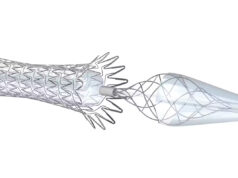The first patient has been enrolled in Medtronic’s IN.PACT arteriovenous (AV) access drug-coated balloon (DCB) study for use in patients with end-stage renal disease.
The US Food and Drug Administration (FDA) has approved the investigational device exemption (IDE) study to evaluate the safety and efficacy of IN.PACT AV access DCB as a treatment for failing arteriovenous (AV) fistulas in end-stage renal disease patients.
“We are delighted to enrol and treat the first patient in this significant study of IN.PACT AV access DCB in patients with obstructed AV access,” says Jeffrey Hull, principal investigator at Richmond Vascular Center in Richmond, USA. “Maintaining access patency is critical to delivering dialysis treatment, and for salvaging failing AV fistulas. Durable treatment options in these patients are limited.”
“This important clinical study is designed to address the clinical need for new, innovative options for patients with limited AV access,” says Robert A Lookstein, national principal investigator in the US and professor of radiology and surgery, vice-chair of interventional services, and medical director of clinical supply chain at Mount Sinai Healthcare System, New York City, USA. “DCBs are supported by clinical evidence in patients with peripheral artery disease (PAD) in the upper leg. We hope that this study may provide data to support this DCB’s use to improve patency and reduce the need for repeat interventions in AV access sites for patients on dialysis.”
The IDE study will evaluate the safety and efficacy of the IN.PACT AV Access DCB for up to two years at approximately 30 sites in the USA, Japan, and New Zealand. In addition to Robert Lookstein, global principal investigators include: Andrew Holden, director of interventional radiology at Auckland Hospital, Auckland, New Zealand, and associate professor of radiology at Auckland University, New Zealand, and Hiroaki Haruguchi, clinic director at Haruguchi Vascular Clinic, Tokyo, Japan.
The study will aim to enrol 330 patients with a 1:1 randomisation to either treatment with IN.PACT AV access DCB or standard PTA. The primary efficacy endpoint is patency of dialysis fistulas through six months and the primary safety endpoint is serious adverse events through 30 days.
The IN.PACT AV access DCB is based on the IN.PACT Admiral DCB technology. The IN.PACT Admiral DCB is FDA-approved to treat patients with PAD in the upper leg.
IN.PACT AV Access is an Investigational Device and is not FDA-approved for sale in the USA.













